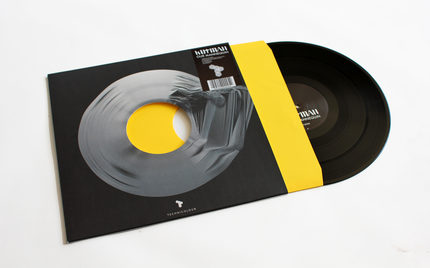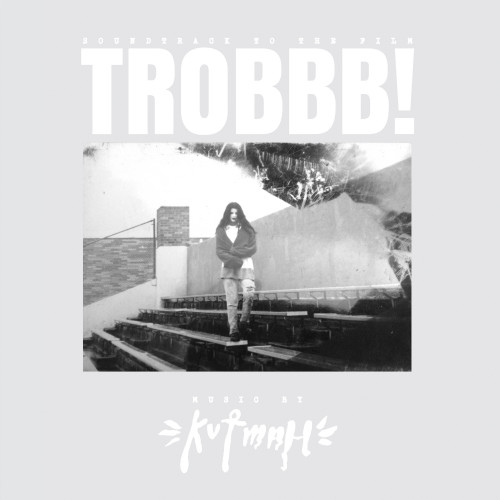Our Mannequin
by Kutmah
— Released 25th August 2014
Underground electronic talisman Kutmah doesn’t often release new music. That’s an approach that runs counter to the paradigm; unedited, under considered, unfinished songs being constantly flung up onto blogs and Soundclouds - and that alone makes him stand out. More so though, the quality of his music does. Remember that first, visceral thrill you felt at hearing music made electronically? The sort of thing that came out Germany in the late ‘70s and early ‘80s, the weird, hypnotic, gr...
Underground electronic talisman Kutmah doesn’t often release new music. That’s an approach that runs counter to the paradigm; unedited, under considered, unfinished songs being constantly flung up onto blogs and Soundclouds - and that alone makes him stand out. More so though, the quality of his music does. Remember that first, visceral thrill you felt at hearing music made electronically? The sort of thing that came out Germany in the late ‘70s and early ‘80s, the weird, hypnotic, gripping meld of soul and machine? That’s the sort of shock of the new you hear in Kutmah.
Our Mannequin conjures up the spirit of early electronic music in more ways than one. His funk-ridden drums and bass, synths that drench over the ear like waves, and filtered, robotic vocals hark back to German synth-wave and post-punk. The difference is the in the tempo, which clearly demarcates Kutmah's roots in the LA-via-London, leftfield beat scene.
The first clubs Kutmah went to were goth industrial nights, where he heard "weird shit that you can dance to." That clearly shows on this latest EP. It’s easy to forget the funk you could hear in early industrial music; can still hear in the long-living pioneers like Richard H Kirk. "No one was chatting, they were just dancing" Kutmah says of clubs such as Kontrol Factory in Hollywood. If he loved the music, he was less keen on the scene.
His early musical axis ran between Suicide and NWA, influences that go some way to representing the originality you hear in his music. It was after he was deported back to the UK from LA that he "locked himself in a room and made this dark record." He brought the EPs collaborators into the shadows with him. "Zackey Force Funk usually make’s thug dance music," Kutmah says, "and Seven Davis JR will never do a record like this again."
The EP "represents the third member of a relationship," he says, cryptically. One thing is for certain, this is music of rare quality, and it entrances the ear from a first listen. Kutmah’s inspiration may have been darkness, but that locked room was vibrantly fruitful.

Our Mannequin
by Kutmah
— Released 25th August 2014
Underground electronic talisman Kutmah doesn’t often release new music. That’s an approach that runs counter to the paradigm; unedited, under considered, unfinished songs being constantly flung up onto blogs and Soundclouds - and that alone makes him stand out. More so though, the quality of his music does. Remember that first, visceral thrill you felt at hearing music made electronically? The sort of thing that came out Germany in the late ‘70s and early ‘80s, the weird, hypnotic, gr...
Underground electronic talisman Kutmah doesn’t often release new music. That’s an approach that runs counter to the paradigm; unedited, under considered, unfinished songs being constantly flung up onto blogs and Soundclouds - and that alone makes him stand out. More so though, the quality of his music does. Remember that first, visceral thrill you felt at hearing music made electronically? The sort of thing that came out Germany in the late ‘70s and early ‘80s, the weird, hypnotic, gripping meld of soul and machine? That’s the sort of shock of the new you hear in Kutmah.
Our Mannequin conjures up the spirit of early electronic music in more ways than one. His funk-ridden drums and bass, synths that drench over the ear like waves, and filtered, robotic vocals hark back to German synth-wave and post-punk. The difference is the in the tempo, which clearly demarcates Kutmah's roots in the LA-via-London, leftfield beat scene.
The first clubs Kutmah went to were goth industrial nights, where he heard "weird shit that you can dance to." That clearly shows on this latest EP. It’s easy to forget the funk you could hear in early industrial music; can still hear in the long-living pioneers like Richard H Kirk. "No one was chatting, they were just dancing" Kutmah says of clubs such as Kontrol Factory in Hollywood. If he loved the music, he was less keen on the scene.
His early musical axis ran between Suicide and NWA, influences that go some way to representing the originality you hear in his music. It was after he was deported back to the UK from LA that he "locked himself in a room and made this dark record." He brought the EPs collaborators into the shadows with him. "Zackey Force Funk usually make’s thug dance music," Kutmah says, "and Seven Davis JR will never do a record like this again."
The EP "represents the third member of a relationship," he says, cryptically. One thing is for certain, this is music of rare quality, and it entrances the ear from a first listen. Kutmah’s inspiration may have been darkness, but that locked room was vibrantly fruitful.









